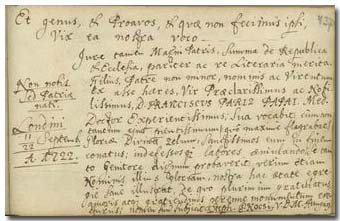
Et genus, & Proavos, & quae non fecimus ipsi,
Vix ea nostra voco. – – – *
Jure tamen Magni Patris, Summa de Republica & Ecclesia, pariter ac
re Literaria merita Filius, Patre non minor, nominis ac Virtutum
ex asse haeres, Vir Praeclarissimus ac Nobilissimus, D. FRANCISCUS
PARIZ PAPAI. Med. Doctor. Experientissimus; Sua vocabit: cum non
tantum ejus pientissimum (: quô maximè flagrabat :) Gloriae
Divinae zelum, sanctissimos eum in finem conatus; indefessosque
labores aemulando; se tanto genitore dignum probaverit: verùm
etiam Nominis illius gloriam, nostra haec aetate egregiè sanè
illustrat, de quo plurimùm gratulatus, amoris atque gratitudinis
perenne monumentum erecturus; nomen suum subjicit Steph[anus] Cs.
Kocsi, V[erbi] D[ivini] M[inister] Hungarus.
Non nobis sed Patriae nati.
Londini 11/22 Septemb. A. 1722
|
* Ovid, Metamorphoses
13.140-141: “Nam genus et proavos et quae non fecimus ipsi /
vix ea nostra voco…” We quote the English translation by Brookes More.
|
|
|
Now as for ancestors and noble birth / and deeds we have not done
ourselves, all these / I hardly call them ours. *
With right can call his, however, the
exceptional merits of his father acquired in the cause of the
fatherland, the church and literature: his son, full heir of his
name and virtues, the very eminent and noble FERENC PÁPAI PÁRIZ,
the experienced physician; as he has not only proven himself
worthy of his father through his ardent zeal towards divine glory
and indefatigable working, but in the meantime he also renders
more illustrious his father's name; for which I repeatedly
congratulate him, and have erected him a monument of my love and
gratefulness by signing here my name: the Hungarian István Cs.
Kocsi, servant of the divine Word
We were born not for ourselves,
but for our fatherland.
In London, on September (by the
old calendar 11) 22, 1722.
|
p. 437. London, September 22, 1722
Kocsi Csergő, István
(?-1726), Reformed pastor,
peregrinating student
István Kocsi (Csergő) was born in Debrecen,
the son of the Reformed pastor Bálint Kocsi Csergő (1647-?).
He began the upper classes of school in Debrecen in 1710, and from
April 1719 on for a year he was senior of the academy. From 1721
he studied in Zürich, from the middle of the year in Franeker, and
from December 1722 in Utrecht; then he spent a longer period in
England. He died on the way back home in Hamburg, on July 3, 1726.
His works are: Positiones theologicae … 23.
Jan. 1721. Tigurii. – Dissertationis theol. textualis de voto
peregrinantis Jacobi, in locum illustrem Genes. XXVIII. v. 20.,
21. et 22. Pars prior, praeside Ruardo Andala. Pars posterior
praeside Campegio Vitringa filio. Franequerae, 1722. Accedit
Aphorismorum argumenti elenctici, per universam theologiam decas
LIX. quam praeside Campegio Vitringa … in auditorio domestico
defendet XXI. Febr. 1722.
We know very few about the life of István
Kocsi Csergő. His printed works are the landmarks of the
stations of his peregrination. In January 1721 he took his
examination of theology in Zürich. In 1722 he defended his thesis
presented in exegesis and universal theology in Franeker; the
chairmen (praeses) of the defence were Ruardus Andala and
Campegius Vitringa, Jun., whose mementos also can be read in the
album (pp. 129,
125). According to this note, Kocsi Csergő
was in London in September 1722 – that is before his studies in
Utrecht and his longer stay in England – and already at that time
he was pastor (V.D.M. = verbi divini minister, “servant of the
divine Word”).
•
AlbFran 315 • Szinnyei • Zoványi-Ladányi |

